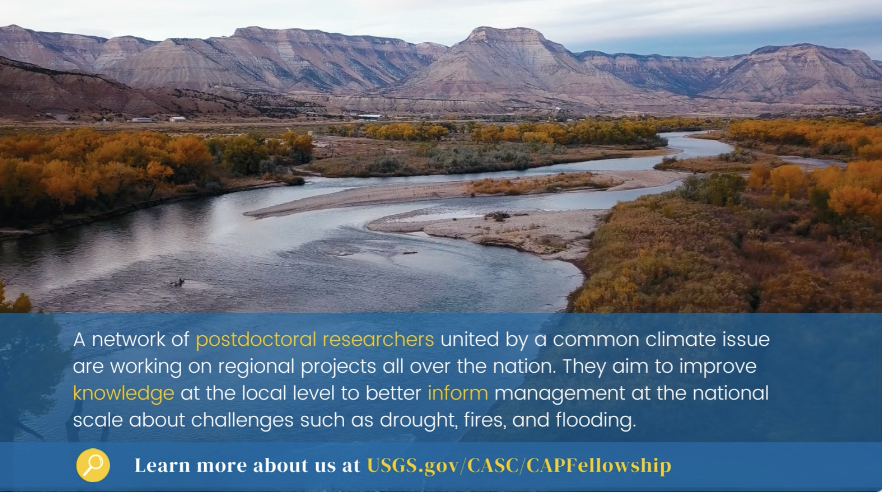New USGS Climate Adaptation Postdoctoral Program Announced

CONTACT
Katherine Smith | katherinesmith@usgs.gov
Rebecca Irwin | reirwin@ncsu.edu
While climate issues are often placed into broad categories, like “fires” and “drought,” their impacts vary from region to region. Resource managers and decision makers need local expertise within these categories to develop successful strategies for adapting to climate change.
The USGS National and Regional Climate Adaptation Science Centers are proud to announce the creation of the Climate Adaptation Postdoctoral (CAP) Fellows Program. Fellows in each two-year cohort conduct research across the country, creating a national network of experts on the same topic. Each fellow is hosted by a university affiliated with one of the nine regional Climate Adaptation Science Centers (CASCs). The fellowship is punctuated by professional development courses and travel to national cohort meetings and workshops.
The current 2021-23 cohort’s topic is “Future of Fire.” Seven fellows are combining their regional expertise on fire and climate impacts to jointly create a nation-wide wildfire management synthesis project. Fellows are also working independently on regionally-specific projects. For example, Reetam Majumder is working with the Southeast CASC at North Carolina State University to examine prescribed burns under future climate scenarios, while Alyssa Anderson is working with the Pacific Islands CASC at the University of Hawaiʻi Manoa exploring wildland fire management.
“A warmer planet has complex consequences for natural resource management. The CAP Fellows program provides a unique opportunity for a phenomenal new generation of scientists to tackle these problems by working on the cutting edge of multiple disciplines like climate science, data science, and ecology,” says SE CASC Research Ecologist Adam Terando, co-PI along with Jaime Collazo, NC State University, for the Southeast CASC regional Future of Fire project, Development of an Early Warning System to Identify Changing Prescribed Burn Opportunities Across Southeast US Fire-Adapted Habitats.
“The SE CASC project aims to develop an early warning system to identify changing prescribed burn opportunities across Southeast US fire-adapted habitats, and also to characterize extreme wildfire risk on decadal time scales,” says 2021-22 Climate Adaptation Postdoctoral Fellow Reetam Majumder.
The Climate Adaptation Science Centers network is a partnership-driven program that teams federal scientists with natural resource managers to help fish, wildlife, waters, and lands across the country adapt to climate change. The CASC network funds management-driven research and supports the next generation of scientists as they develop new ways to help natural places survive and thrive under climate change.
For more information about the CAP program: https://www.usgs.gov/programs/climate-adaptation-science-centers/casc-network-climate-adaptation-postdoctoral-fellows
For more information on the region-specific project of the Southeast Climate Adaptation Science Center: https://secasc.ncsu.edu/science/future-of-fire/
- Categories:
